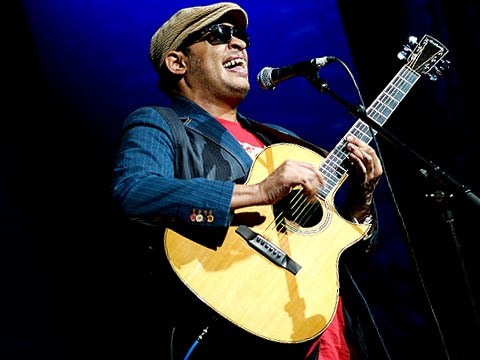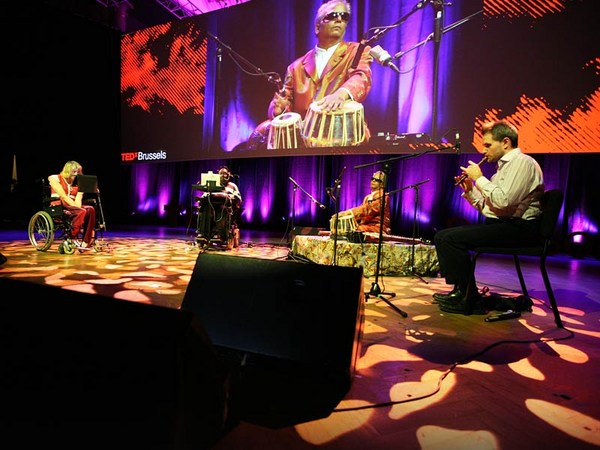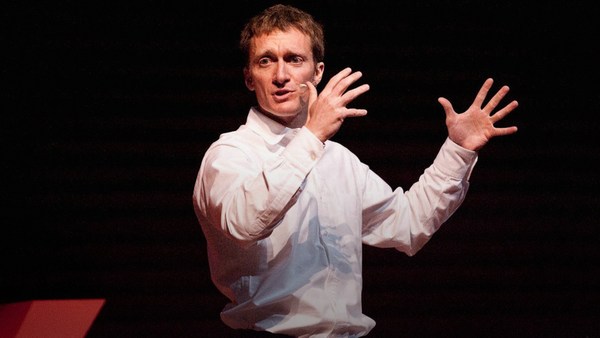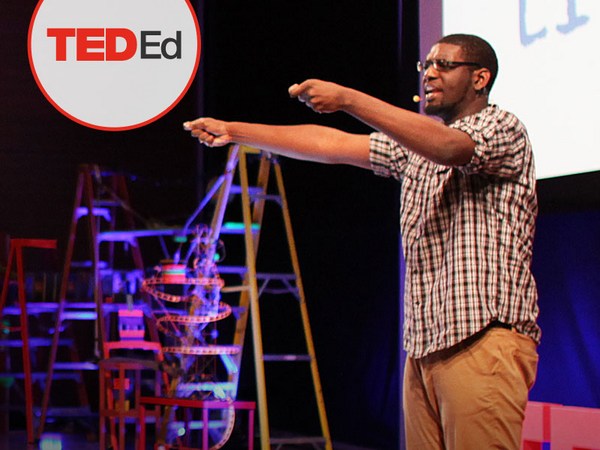Mariano Sigman: So this day is about trust, and it happens in a quite peculiar moment in which, I guess we all know, societies have become quite polarized. And there are certain topics that have become very difficult to talk, we are very distant with people, and it's become really with a feeling that's difficult to talk about these topics. And Dan I wanted to think and to reflect about these, but instead of doing in the traditional way, which is on this stage, in which, like, maybe we think about these, we come with a great idea, we pack it in a story, and we give it to you, we asked, what if we try to construct this idea here, together, and we began thinking about this in this place. And so we are scientists, and so we love to do experiments - in the lab, outside, we live, actually doing experiments; I think that's fair to say. And so actually the proposal is let's do one experiment here, now, altogether. And so to begin the experiment, this is not really high technology, it's based on pencil and paper. And if you look just behind your chairs, if you put your hand, you'll see that all of you should have, I hope, one envelope like this. Dan Ariely: Don't open it yet. MS: Just go like this because usually the sound of papers is very - collective sound of paper is very good, so just ... (DA: Yay) Very well. DA: Very good. Anybody doesn't have an envelope? MS: Okay. DA: Okay. MS: We can start. DA: So let's start. So ... please open the envelope. MS: First page. Where it says, "TEDxperiments," that's the first page. That's where we will begin. DA: Do they have a pen? MS: Well, you should have a pen. If you don't have a pen, then you can ask a pen to your neighbor. I mean, I'm sure there are enough pens that we can do this together. Because you were given pens in the bag. DA: In the bag there's a pen, yeah? MS: As we said, this is a real experiment; it is not demonstration. So we will use the data collected here to learn something about what's going to happen here. So for this we need you to sign that you're willing to be part of this experiment. This is how science goes. So if you're willing to do this, just say "Yes" here - Sim, and if not you say "No" and you write your age and your gender, and we move to page number two. DA: Everybody finished? Anybody has not finished with page number one? Okay. Make sure you get a pen. Finish page number one. Okay. Next page. There's some things written in Portuguese here. MS: I should - I'm closer to Portuguese than you, right? DA: Yeah. MS: Well, actually, not geographically, but maybe - So I'm going to make my best effort to read them. You see there are five questions. You can read them yourselves. And those are five questions where we ask you to say where you agree with these or not, or where you feel you can have an opinion. We'll go relatively fast with these. So the first question is: (Portuguese) "There should be quotas for women in Parliament." I have a bit of a Brazilian, you know, we're closer to - I'm Argentinian, what could I do? So either you agree, you don't agree, or you just don't want to answer or don't feel like you have an answer for that. So as you see, we chose things where hopefully there is some difference between us. The second one is: (Portuguese) "Drugs should be decriminalized." So (Portuguese) Yes, No, (Portuguese) or Not sure / No response. DA: So this is something about drugs. MS: This, yeah. DA: It's a good question. MS: We'll see. Question number three. (Portuguese) "University should be free for everybody." (Portuguese) Yes, No, or Not sure / No response. This is about university. DA: Should university be free for everybody? MS: Yeah, that's the question. Please don't answer it. DA: No. MS: Now, question number four. (Portuguese) "Everyone should use public transportation instead of cars." DA: Should we all [use] public transportation instead of cars? MS: You know Portuguese, man! DA: Yeah, yeah. MS: (Portuguese) Yes, No, or Not Sure - Again - well, you know. You want to read the fifth one? DA: No. MS: Okay. (Laughter) MS: (Portuguese) "Smoking should be forbidden in all public places." DA: Something about smoking. MS: (Portuguese) Yes, No, Not sure / No response. It says, "Smoking should be forbidden in all public places." DA: Great. Everybody finished? Great. Now comes the tricky part. You have a number on your envelope. MS: It's also on the first page if you lost the envelope. DA: And somebody else has the same number on their envelope. And what you're supposed to do is to find that person. Let us show you how you find them. You say, "290!" MS: 290! DA and MS: Ahhh! DA: Okay, wait. So you find a person - Come on! Stand up! They should be not too far from you. If you don't find that person, stand up. If you find the person, sit down. If you haven't found the person, stand up and show it around until you find the person. If you find the person, sit down. You found it? MS: Look, please, please, hey, pspsps. We need some silence, some silence. People! Hey, hey! Please, please, silence! DA: I have a trick. The secret of having good sex ... (Laughter) MS: People, please, please, please make some silence here. DA: Let me try again. A guy goes to the rabbi, and he says, "Rabbi, I think my wife is trying to kill me. Would you talk to her and find out if that's the case?" No, it doesn't work. MS: No. Anal sex! (Laughter) DA: Okay! Quiet! MS: That's always - Okay, you know, you should - hey! People that don't have a partner, you silently go to the [aisle], you find someone else, and you just invent a number, and you write down the number for the two envelopes. Once you find a partner, from now on, you have four minutes to do the following thing. Please pay attention. You have to discuss about these five questions, freely. You can discuss one of them, three of them, four of them, the one you like the most. And you have to write down - pay attention to this: In part three, you have to write down the opinion, the responses, of the person you are talking with. So here is part three, and you will have to - Sorry, in part two - no in part two. In part two, you will have to respond the answers of your partners. So you have four minutes from now on to talk with the other person and try to choose the more sensitive issues. Your time. Now you can talk all what you want. Start! DA: Go! (Audience chatter) Audience member: (Portuguese) Hey Marcos, which one? Marcos: (Portuguese) Decriminalizing drugs. Audience member: Ah! (Portuguese) Let's do it. Marcos: (Portuguese) How crazy. (Laughter) Audience member: (Portuguese) To me, the TED audience will agree on ... [3 minutes later ...] DA: Ehm, we want to make sure you write the opinions of the other person on part two. So in part one, you write your own opinions. In part two, you write the other person's opinion. And once you finish that, in the bottom, there's a short description of how you should end your discussion. So please follow these instructions of how to end this discussion, and then - Follow the instrucitons. MS: Let's see two groups. (Audience chatter) DA: Okay. And now, please fill part number three. Fill out part number three. MS: Part number three is private. DA: Private. MS: Do it alone. Each one alone. Groups now are over. You do it alone, and you fill part three. DA: Part three, please fill it out. And once you filled it out, take this, and put it back in your envelope. And please pass the envelopes forward. Quietly. Okay, so - So here is the question: No, no, no. Don't seal it. Don't worry. It's not that secret. Okay, so, why did we do this? MS: Why did we do it? DA: Why did we do it? MS: So, as you can see, these questions are questions where people have hopefully, I mean maybe in some of these groups, you agreed completely; in some of these groups, maybe there were a lot of differences. And as you may imagine, as you may imagine, we tend to like, we tend to trust, we tend to think that people that think like us are actually better, more attractive, more trustable. So we wanted to ask this question. In the very end, you all responded questions about liking the other person. But there was a bit of a trick. DA: So wait. So the first thing is we wanted to replicate previous results that basically say when people are more similar to us, we like them more. And there's actually quite a few interesting nuances. MS: Yeah, so - DA: What you found? MS: So we've done - I mean, this is the second time we did this experiment. We did the first in Argentina with 10,000 people, and now we are doing it again here in Portugal. And what we are trying to show, the first thing - There are two things about this experiment that we are trying to test - there are questions, there are hypotheses that we would like to respond. The first one is you may have seen that some of you, when you finished the discussion, you did something like this. And some of you did something like this. And it happens to be not quite the same. We asked - and we ask this question as always in science because we have reason to believe that if we hug the other person, can this make us immune to this bias by which we do not accept so much the differences? And it seems to be, this is what we are finding, this is what we would like to confirm here - DA: Too much for me, let's get a little far. MS: This is what we are trying to confirm here, that once we hug the other person, we're more open, and we're willing to trust the people that think like us but also the people that think differently for us. DA: So the question is whether the hug - it basically bonds us and can bridge differences. Now, lots of those things about our differences are nothing that are explicit. Before the session, there was this beautiful video from Denmark. Right? About all the people with the differences and so on. I was in Denmark a couple of months ago, and there's a very funny thing happening in Denmark, which is kids start learning Danish about two years slower than they learned 20 years ago. For some reason, Danish kids are slower now picking up language. And the question is why. Why does it happen? It doesn't happen in Norway. It only happens in Denmark. And what they found is that the reason is that the parents are speaking faster and swallow their words. They make it harder for the kids to learn language. Again, why would parents do that? And the current theory is that it's a barrier against immigrants. So what the Danish are doing - not explicitly, it's not that the Danish say explicitly, "We hate foreigners; let's do it," but as a society, they created a mechanism that creates barrier for new people. And the barrier is that it's harder to learn Danish - they also make it harder for their own kids to learn Danish in the process - and it's an implicit barrier. So the question we wanted to ask here, and we'll figure out the results, is whether some kind of physical connection helps us bridge the gaps. We've tried all kinds of things in the past about bridging gaps, including the four-minute discussion that you have and the results were very impressive, right? The results show that even a four-minute diuscussion on things that people really disagree with helps bridge the gaps. Now we're going to try to figure out whether it's also about physical proximity, whether it helps. MS: So again, this seems to be the case. And sometimes, you know, science does not have to be rocket science. I mean, giving a hug is not a lot of technology, but maybe it's quite powerful, and this is what we are trying to show, that people become much more tolerant once they've done so. And to me, you know, I watch a lot of football; this is - I mean, what can I do, I'm Argentinian. And people that watch a lot of football, of course, there is not a lot of good football. So if you watch a lot of football, you watch some good football and a lot of bad football. DA: Argentianian, you say. MS: Yeah, Argentinian football - bad football. And so, often, I'm watching this game which is completely irrelevant, like a second division game in the Luxembourg League. I mean, imagine something more irrelevant than that. And it's like a game in the middle of the championship - irrelevant because it's in the middle of a championship. And the game is already closed - there's nothing that will change. And there is a goal there. So you see how irrelevant this is. It's the most irrelevant league, the most irrelevant game, the most irrelevant moment. But the players, they hug each other like it would be the most important moment in the universe. It's like you see them and you go, What's going on? And so when I saw that, I reflected, I know how it's for you in your professions. I'm a scientist; I've done science for 20 years, and I think I've never hugged any of my colleagues. I mean, I've had very good moments, good discoveries, good - I mean, moments of thought, good moments of enthusiasm. But I've never said, You know what, this is so important that we should hug each other in this moment of intense bonding that actually football players do. And so maybe what we should hear is that this is quite important, and so we proposed here maybe to change that. After 20 years, with one of my friends and colleagues, we're going to change that, and we invite you to actually hug - DA: Let's demonstrate. Let's demonstrate. MS: Physical contact can be like this ... or it can be ... like this. So you choose [Inaudible] Both: Oooooh. Rrrrghhhhh. (Laughter) (Applause) DA: Okay, now - MS: Everybody do the same. Strong hug. Come on. DA: Real hug. A real hug. (Audience chatter) DA: I can feel the oxytocin. Thank you very much, and we will report the result of the experiment soon. MS: (Portuguese) Thank you! Bye! (Applause) (Cheers)
Related talks

Nellie McKay: "Mother of Pearl," "If I Had You"

Raul Midon: "Tembererana"

Charles Hazlewood + British Paraorchestra: The debut of the British Paraorchestra

Damon Horowitz: We need a "moral operating system"

Carvens Lissaint: "Put the financial aid in the bag"
